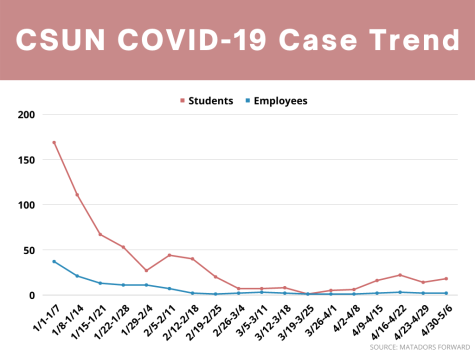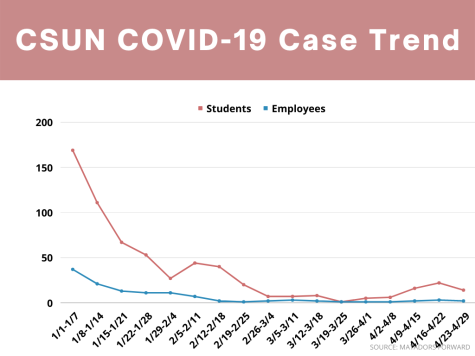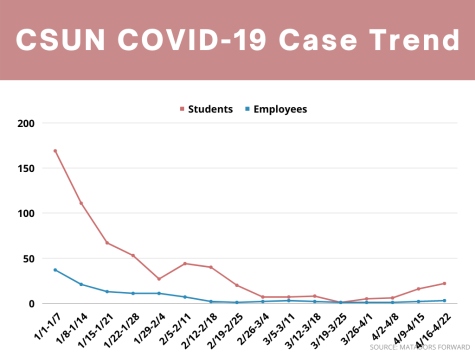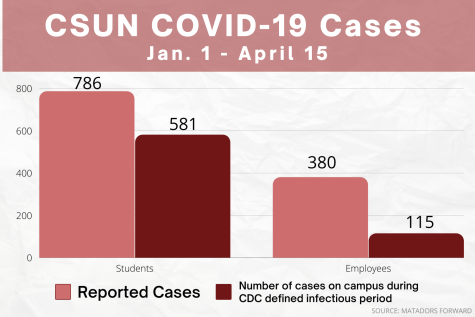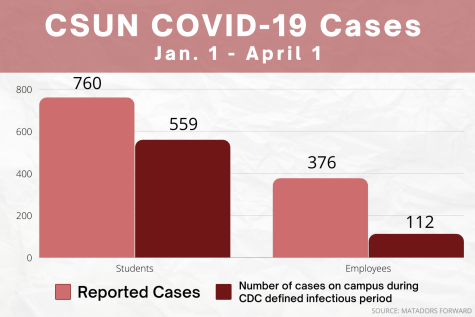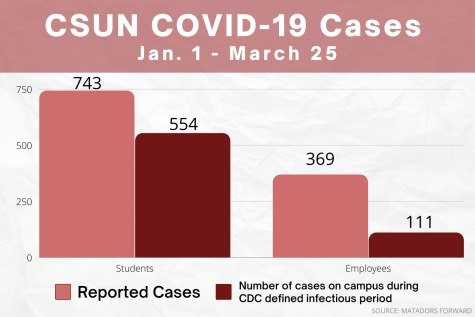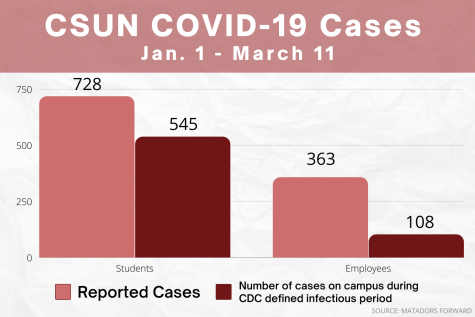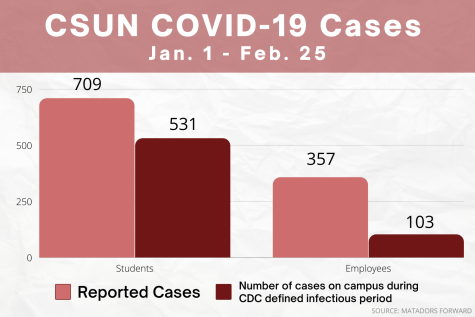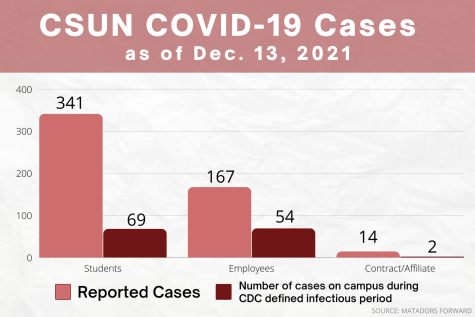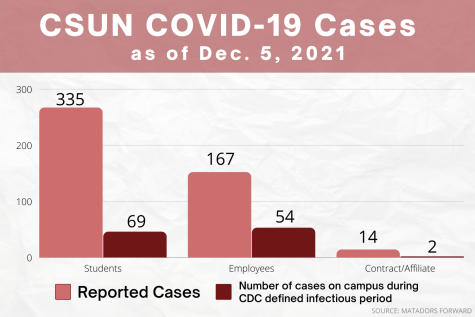People of color disproportionately affected by COVID-19, according to data
August 7, 2020
Los Angeles County has the most cases in the U.S., as other hotspots like New York have experienced a decrease in the number of new cases.
The Centers for Disease Control forecasts an upward trend in the number of deaths nationwide. L.A. County currently holds the record for the most confirmed cases in the nation.
We have compiled data and guidance from the L.A. County Department of Public Health and the Johns Hopkins University and Medicine’s Coronavirus Resource Center to provide an update for L.A. County. The data is up to date as of Aug. 7, 2020.
Here is your weekly COVID-19 update.
Total cases:

Since the first confirmed case of COVID-19 in L.A. County on Jan. 26, the number of positive cases continues to rise. Nearly 2% of L.A. County’s population of 10 million has tested positive for COVID-19.
The communities of unincorporated East L.A., Pomona, South Gate, Boyle Heights, El Monte have seen the most cases in L.A.
The most testing has occurred in Santa Clarita, Glendale, unincorporated East L.A., North Hollywood and Pomona.
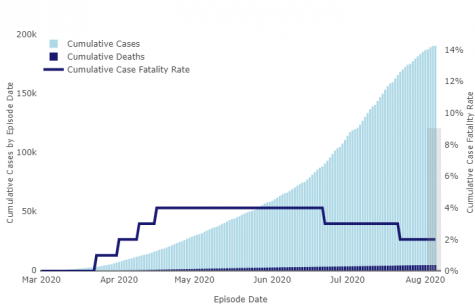
Hospitalizations:
There are 1,610 COVID-19 positive patients currently hospitalized in L.A. County. 499 COVID-positive patients are in the Intensive Care Unit. The county currently has 836 available ICU beds.
The state’s goal is to keep hospitalization increases below 10%. L.A. County is meeting the goal, as hospitalizations are currently at -5 %.
Race and ethnicity:
L.A. County’s data show that cases and deaths disproportionately affect people of color.
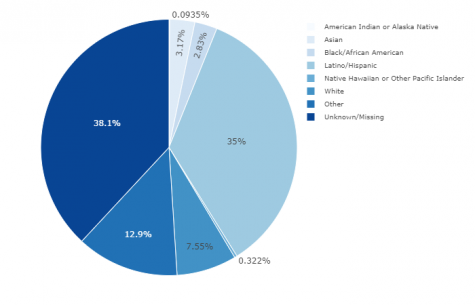
The L.A. County Department of Public Health reports 35% of cases are from the Latino population, whereas only 7.55% of cases are from the white population. Latinos account for almost 49% of all COVID-19 deaths.
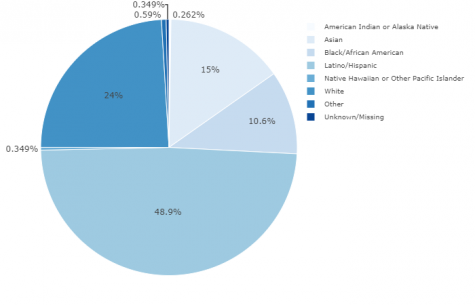
In California, people of color are more likely to say the coronavirus has seriously impacted their ability to meet their family’s basic needs, according to a poll conducted by UC Berkeley Institute of Governmental Studies.
Local official updates:
No more parties in L.A.
Starting Friday, L.A. Mayor Eric Garcetti authorized the Department of Water and Power to shut off services at homes hosting large parties. He said these hosts who hold large gatherings are usually repeat offenders, and shutting off utilities would be an effective way to curve that behavior.
“The risk that they are putting people at is a risk for all of us,” Garcetti said. “And we have to make sure that we do not see these super spreader events pushing us all back indoors, closing businesses down and ultimately taking lives.”
Early promise
The seven-day average of cases in California has dropped 21% from last week. This is an “early good sign” of COVID-19 conditions, according to Gov. Gavin Newsom.
“We’ll need to see another few weeks of this kind of data to come in to feel more confident about where we are as a state,” Newsom said.
Technical difficulties
Dr. Mark Ghaly, the California Health and Human Services secretary, said there is a technical problem causing inaccurate data in electronic lab results of total tests conducted and positive results. There are no details as to when the issue will be fixed.
The L.A. County Public Health website states: “Public Health anticipates receiving a backlog of cases once state electronic laboratory system issues are fixed. Data sources that track other key indicators, including hospitalizations and deaths, are not affected by this reporting issue.”
What’s open:
Grocery stores
Essential retail
Some non-essential retail with modifications
Parks and beaches with modifications
Golf courses
Hotels
Shared residential pools
Nail salons (outdoors with modifications)
Hair salons (outdoors with modifications)
What’s closed:
Indoor dining at restaurants
Indoor houses of worship
Gyms
Bars
Indoor shopping malls
Tattoo shops
Indoor barber shops
Face masks are still required in public. Gatherings should be limited to only people in your household.
Testing:
The L.A. County website lists 119 testing locations available for both walk-up and drive-up testing. Testing is available by appointment only.
Below are testing locations most local to CSUN. A comprehensive list of testing locations can be found here.
Drive-up testing Locations:
Balboa Park
5903 N. Balboa Blvd., Van Nuys, CA 91406
CVS – Burbank
1820 West Verdugo Ave., Burbank, CA 91506
Hansen Dam Recreational Center
11798 Foothill Blvd., Lake View Terrace, CA 91342
CVS – North Hollywood
10945 Victory Blvd., North Hollywood, CA 91606
Rite-Aid North Hollywood
11350 Victory Blvd., North Hollywood, CA 91606
DPH – Pacoima Health Center
13300 Van Nuys Boulevard, Pacoima, CA 91331
818-896-1903
Center for Family Health & Education
8727 Van Nuys Blvd., Panorama City, CA 91402
888-511-9660
CVS – Reseda
7400 Reseda Blvd., Reseda, CA 91335
CVS – San Fernando
1204 San Fernando Road, San Fernando, CA 91340
Rite-Aid Sylmar
13803 Foothill Blvd., Sylmar, CA 91342
Mid-Valley Comprehensive Health Center – DHS
7515 Van Nuys Blvd. Van Nuys, CA 91405
818-627-3000
West Valley – Warner Center
6097 Canoga Ave., Woodland Hills, CA 91367
CVS – Winnetka
19701 Vanowen St., Winnetka, CA 91306
Walk-up testing locations:
Comprehensive Community Health Centers, Inc. Glendale
801 S Chevy Chase Dr #250, Glendale, CA 91205
818-265-2264
Comprehensive Community Health Centers, Inc. North Hollywood
12157 Victory Blvd, North Hollywood, CA 91606
818-755-8000
Comprehensive Community Health Centers, Inc. Sunland
8316 Foothill Blvd., Sunland, CA 91040
818-273-8800
